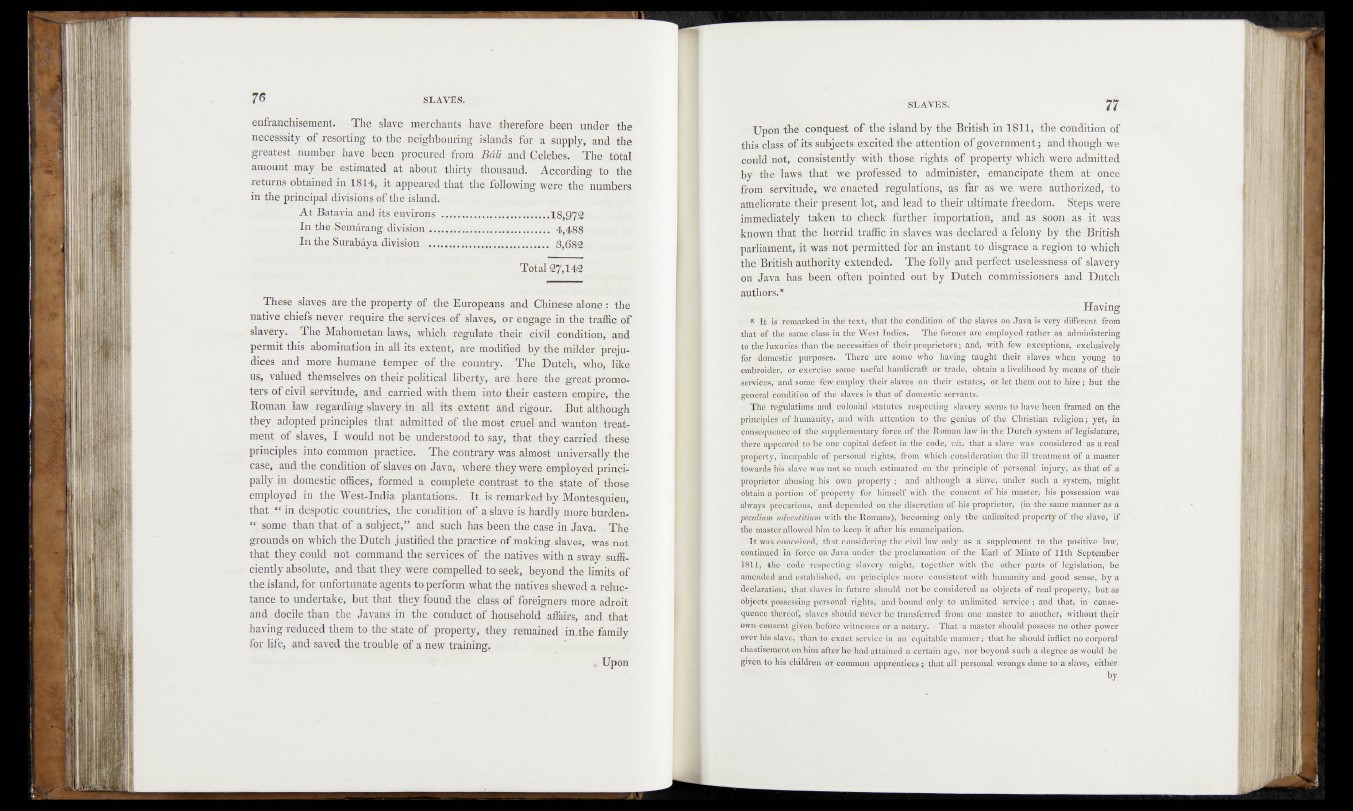
enfranchisement. The slave merchants -have .therefore -been under, thp
necesssity of resorting to the neighbouring islands for a supply, and the
greatest number have been, procured; from Bali and Celebes, r.; The ;total
amount may be estimated at about ^thirty thousand. According to the
returns obtained in 1814, it appeared that i the following-^-jvere the numbers
in the principal divisions of the island.
At-Batavia and its environs ........ ...........................18,972
In the ;Semarang. division..................................... | 4,4,§8
In the Surabaya division ..............................|........ 3,682
Total 27,142
These slaves .are the property of the Europeans and Chinese-alone : thq
native chiefs never require the services of Slaves, or engage in the traffic.pf
slavery. The Mahometan laws, which regulate their civil; condition,! and
permit this abomination in all its extent,^are modified-by the. milder prejudices
and more humane temper of th&jcountry. The Dutch, /who, like
US, valued themselves on their political liberty, are here the great .pisom’q--
ters of civil servitude, f and carried with them into their 'eastern empire,4the,
Roman law regarding slavery- in all its extent and rigour. But-although
they, adopted principles" that admitted of the most cruel and wanton treatment
of slaves, I would not be understood to say, that .• th§yj carriedr.these
principles into common practice. The contrary was almost ;unjyersaUyvthe
case, and the condition of.slaves.on Java, where they were employed principally
in domestic offices, formed a complete contrast to the; state.o&tltpse
employed in,’the West-India plantations^!»! is remarked by Montesquieu^
that “jj-i%despotic countries,, -the condition of a slave;is.hardly.m.ore-hurden-
some.than that of a subject,” and such has been the case in Javat -,The
grounds on which the Dutch justified the practice of mak in g slaves^ was mo!
that they could not command the services of the natives with a sway, sufficiently
absolute, and that they were compelled to seek, beyond thelimits-of
the island, for unfortunate agents to perform what the natives shewed a reluct
tance to undertake,-but that they found the class of .fofeigners more: adroit
and, docile than-jhe Javans .ih" the - conduct of household, affairs, and that
having reduced them.to the state, of property, they, remained in.the family
for^fe, ^ and; saved the troublejpf a. new training.
.sfciflte’S'. 77
-diUpon the -conquest ofii’iHe1 island by-the-British in 1811, 'the Condition of
this^claS's'lof its subjects-rex’citedc4b&-attention of government^ and.though “we
could not;t consistently with those rights of property vfilich were admitted
by the laws *-that" we professed* to ■ administer, emianeipate - them at 'once
fro'm servitude^ we‘enacted-‘¥$§ulationsj ’as’'far as we,fwdre‘ Authorized, tb
ameliorate their present lot, and lead to tnrin ultimate freedom. Steps were
immediately, taken tb^Kegk further importation,'/afid..as.<Jsoon ...as^it^was
known thatrthe^horrid traffiedn slaves was-declared atfelonyfmy th’ei British
parliament, it-'waS'rrot permitted for an instant To^disgrace‘% re’gi’on-tO 'which
rthle British ahthbrity extended. The folly‘h'hd perfect uselessness' of slavery
on Java has been oftpn pointed! out' by Dutch J&mmMrioners und Dutch
Having
• * It is^remarkedoptthe'text, that the condition, of the slaves tin Java is veryndjffeferMfronl
that\of||fi£\same.clasjyn the .West bodies? The^orane^are employed,rameti as .nlminUtf'ring
^ g ^ lw x jir ie s than the necessities o f'their proprietors; and, exceptions, 'exclusively
for 'purposes.r' There* are'some Who- having taught their slaviffi* when 'ymjbgt'to
handicraft or' trhde,' obtain' S’lircliworlSBy'niemis b f "their
services, and!some slaves on?-thbin estates,- or let tliem-'outf!?o/tiifh) but the
general ifeo1iditi6h ''6-®l5B t Slaves (is that of' domestic servants. -
- d^ghejife^lafcitins^arid' Sdldmflj statutes respecting slavery 'sfeeiris,to1 have Been-'framed on thfe
principles7 omhuri!&£wand with attention to the genius of the" .Cmristiair religion'; yet,^ih
Siipplemelit’al'y force^^thS'Eh'rdanTa^iif'ffee'Dutch''system ofregislktiir^
theVe appeared t™y^ra@^^iM/uefeot iiPth!&'c(5dd,'}''e&. th'at' a'slaVe' ^asiycmgiS®@r as a real
of* personal a^nts^ftom whiem consideration a master
ItS^StSjds'his slave wra-nM'^Pgjfch estiiriated’ oh the^rihei^fe^fipersqh^.i^ury, as that of a
proprietor*abusing his own property; kfid'! '.although a’ slav^f'undwMueh' a sysfeifi; rmgfif
'Ohtl^K portion '-of him'selft-with the cods'enl ^^^ma^teiF&is'-'possfessibht Was
and' degerided''on the>‘dfscretioa^oftW^pr'o'prret6r,J (iS>the shmeihiMS®? as a
yecM^m’b^eMto«m with'th'e^fehimhs)V^becommg only the unlimited propert^of ’the "Slave's^if’
the masl^ail'owed-him to keep-iPaftfewhis; emancipation1.''
I t was conceived, that'conisiddrifig'th'eravil law?only( as a supplement to- the-positive! law,'
continued "in foroferoh Java under* the prdcltw3ftiSn,<o&the1 Earl of/Mihto SepfeinBht
1-81 I f ftlie”xSoa!e,'respectmg slavery (might, together with the o tfie r^ a il■>*e tile |^ ’ uH3ir,'®b'e
affienaed and establikntjd? 'tfifn»priiidiples’'inore'--h2(ffisigt6h't?with hnmamty"a'hd''^m(3|iS^nse|gby a
declaration,' that' slavds*ihlt®mg*S3muld^nrit;' be considered1 aswbjlfct! oT-real property? blit a"S,i
objects 3t®es§ing personal* fights?- and bdufiditonl^'rofunlSulitmJ'SfeEVi^^'hwSI thaitf-’in'Cchn'se-
qfiencbJthdredf? slaves shodld never fe^fthnsferredvfttffl^birel'm'aster; to'-’ another; Withdut'-their
own1 consehtlgiVexy before witnesses or'a' hotary. That a m‘aete^shii^dep^ssti^ifi^,'-other.''.{foi#er'
over his slave, than tfo -exact*service in an equitable' mqffiierf|i that he inoum'InffetJn'oicofp'or-alJ
chastiseniefit^ohhirti1 after he-had iattaiDLed'-'a'’ b e r a g e ^ l ndr*-b eyond such'aidegfee asiwouldlbe'
giVeh) to his'-'cHildien • dricommonl apprentices; that alh personal, wrongs-done th'a'1 slave,' either:
I H